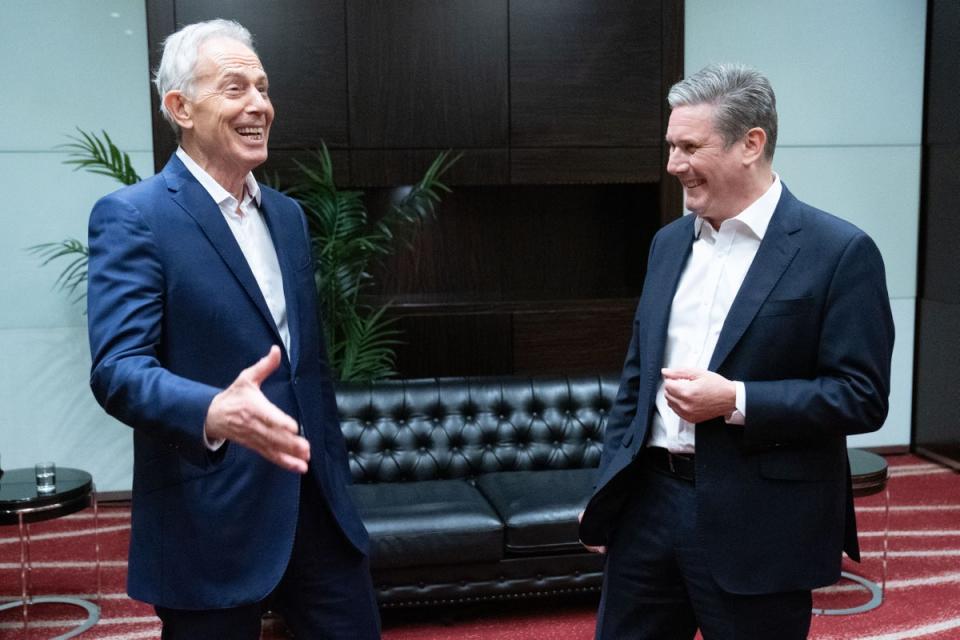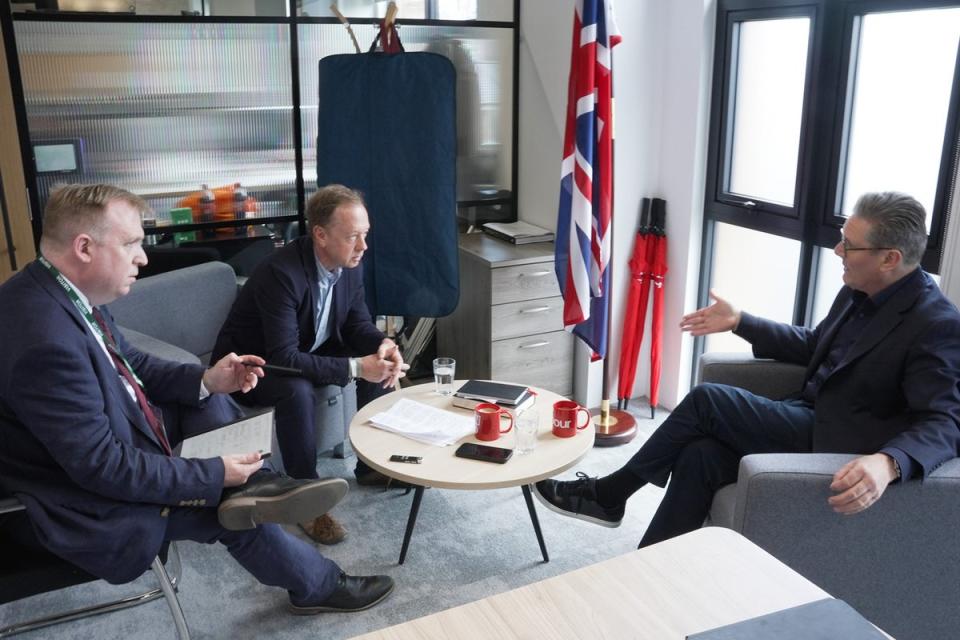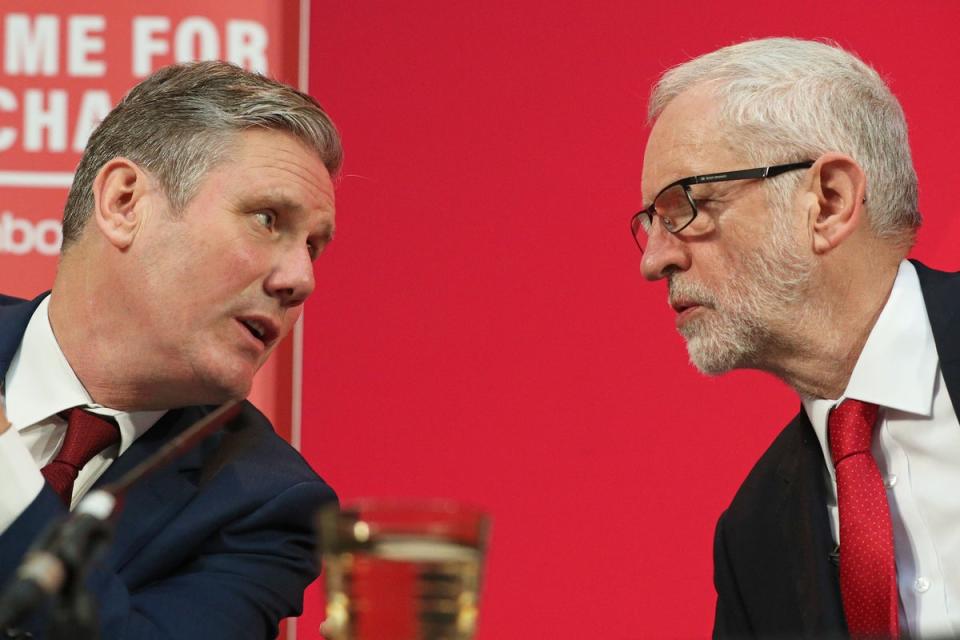Keir Starmer – what he really makes of Trump, Blair and Corbyn
Keir Starmer has laid out his political philosophy and goals which echo the last Labour leader to end a long period in the political wilderness: Tony Blair.
As he prepares for what now seems to be an inevitable landslide victory, Sir Keir said: “I want people to feel ‘Thank God… our country is now better, and I feel better off.’”
His words were not far from the D:Ream song which propelled Blair to victory: “Things can only get better.”
In the second part of his exclusive interview with The Independent, Sir Keir made clear that he has sought Blair’s advice on transitioning from opposition to government but not necessarily on policy. Drawing the veil from his political philosophy he spoke about:
How he would do a deal with Trump
Why he believes the Institute of Fiscal Studies (IFS) is wrong but refuses to rule out tax rises
Where he and Tony Blair disagree
Why he thinks redistribution is a good thing
Why he really stuck around in Corbyn’s shadow cabinet
Read part one of Sir Keir’s interview with The Independent here, where he reveals his innermost thoughts about his family, regrets with his father and homophobic attacks on his boyhood friend.

Sir Keir wryly acknowledged that Blair would not agree with his tax raid on independent school fees adding 20 percent VAT, or his ending of non-dom status, something the New Labour government actually created.
But Sir Keir is also clear that, like Blair, he will not be bound by ideology to get what he wants for Britain.
Nowhere is this more obvious than his willingness to deal with a president Donald Trump if US voters return him to the White House in November.
“Yes! We’ll do a trade deal with America if we can get a trade deal over the line. Presidents are temporary while countries and deals are maybe not permanent but are certainly long term.”
With an eye not just to a potential re-election of Trump but also right-wing leaders winning in European allied states, he added: “I will deal with the leaders of other countries as they’re elected by voters, whether in America or other places across Europe.”
It reflects his repeated message of “country first, party second.”
One fight he appears to have given up on is Brexit. Having fought against Brexit until December 2019, he now will not take Britain back into the EU, single market or customs union even though he wants to renegotiate Boris Johnson’s deal.
“I’ve visited Norway and Switzerland and seen their different deals and it has persuaded me we need a deal that is right for us.”
The Independent asked why he has avoided Brexit as a subject, given he staked so much of his politics on it up until 2020.

“We’re not reopening the wounds,” he said. “We do want a better deal. But it doesn’t involve going back to the single market or the customs union. I think we can make improvements.”
But the biggest dilemma Sir Keir faces is the issue of tax and economic growth – something he has battled throughout the election campaigning.
He firmly disagrees with the Institute of Fiscal Studies (IFS) which has claimed “a conspiracy of silence” about all the parties’ economic plans.
Asked if there is a conspiracy of silence over tax, he insisted: “Every single thing in our manifesto is fully costed and fully funded. And we’ve been really clear about not raising income tax, National Insurance and VAT, and been clear that none of our plans require us to raise tax.”
Asked if he is ruling out council tax rebanding or wealth taxes, he ducked: “I’m not going to write budgets for the next five years. But I’m gonna say there’s a manifesto, there’s our plans, and none of them require a tax increase.”
And his response to whether he will say once he is in power “Oh, it’s much worse than we thought we’re gonna have to reassess and that’s why taxes are gonna go up”, is to say it is wrong.
“No, because the focus is on growth,” the Labour leader said. “But I mean, obviously there is this toing and froing with the IFS and others.
“Most of their [the IFS’s] predictions are based on a sort of snapshot of where we are now, with an assumption that we can’t do much better than we’ve done in the last 14 years, and I think we can.
“That’s why our manifesto sets out plans for growth. One thing what people haven’t highlighted on the IFS is that it does concede is that if you are going to get growth, then the levers, the plans, what we put in our manifesto about planning, infrastructure, skills, industrial strategy, GB, energy, getting people back to work through waiting lists. These are the things you’re going to have to do together.”

The lack of economic growth is a problem that has vexed him for some time: “I have spent the best part of the last two years on this conundrum, which is, why has growth been so low in the last 14 years? I personally think it’s the Achilles heel of our country, and that we have failed to take the tough decisions to deal with it.”
He has been having discussions with global investors asking them what they need to invest in Britain.
“I’ve been having discussions with investors who are very serious about investing in this country, and detailed discussions about the schedule of decisions that need to be taken in the first six to 12 months of a Labour government for that investment to start coming through. So I’m confident we can do this.”
But some of his known tax plans of raiding independent schools with 20 per cent VAT on fees or ending non-dom status, means he is very un-Blairite and almost old Labour class war in his approach.
But Sir Keir has described himself as a socialist and insisted that he supports the concept of redistribution: “There’s nothing wrong with redistribution, but redistribution can’t be a one word answer for great swathes of the country. So we want economic growth.
“There is a model for economic growth, which is London and the South East does all of the heavy lifting and redistribution is the answer for other parts of the country. I don’t accept that model of growth, but that’s why I’ve said it’s got to be growth everywhere.
“That’s why every single place will have a growth plan. That’s why we will empower mayors and combined local authorities with resources, with power to make decisions, why we’ll put the planning decisions with them, why we’ll put the skills decisions with them.
“And, in short, we’ve got the partnerships in each and every area for that precise reason. I’m not against redistribution, but I think the past Labour has sort of used that as a sort of fallback, rather than doing the hard yards of why doesn’t Manchester and Leeds and Birmingham actually have much more significant growth than we see at the moment.”

But the one question which has constantly dogged his leadership is why he stuck with Jeremy Corbyn and backed him so passionately in 2019 only to ditch his policies and expel him once he became leader.
For the first time, Sir Keir has hinted that he stayed in the shadow cabinet to be in a position to turn things round when the chance came.
But he also warned Labour that Corbyn was not the only problem which needed fixing from 14 years in opposition.
“My hope was that we would have a Labour Party we could put before the electorate again. I didn’t decide to run myself for later, until later in the event, but I was determined to hold our position.
“The fact that we stuck with Nato through all those years was really important to me. Why I said what I said about Salisbury [Russia’s attack] and antisemitism because I knew that there would be this day when we might get the chance to get our party back.
“We completely lost our perspective. We lost our way. I would just say this. I think we lost four elections in a row, and one of the mistakes is to think it was just Jeremy Corbyn. We, for many years, I think, had been drifting away from our core sort of values and purpose.
“And therefore, one of the things I’ve instilled in the change Labour Party is don’t just think it was 2019 that was the problem. It’s absolutely deeper than that, and that’s why the change is deeper than that.”
Read part one of Sir Keir’s interview with The Independent here, where he reveals his innermost thoughts about his family, regrets with his father and homophobic attacks on his boyhood friend


